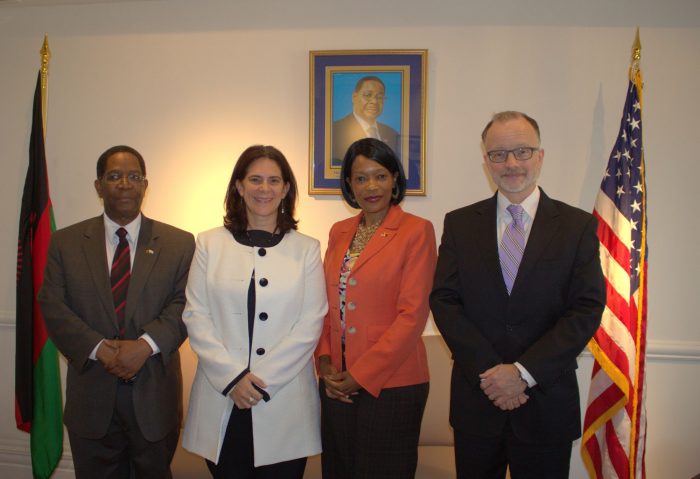
October 15, 2015
Visiting six donor and host country embassies over the past two weeks, NCBA CLUSA senior leadership and program management teams continue to build relationships with the embassies representing governments where NCBA CLUSA has programmatic activity.
Following a round of embassy visits last spring, the most recent visits focused on introducing host and donor embassies to NCBA CLUSA’s most recently added projects, including two newly added country portfolios – Madagascar and Malawi.
In both Madagascar and Malawi NCBA CLUSA works as the technical partner for USAID funded projects led by Catholic Relief Services, assessing value chains and strengthening local farmer organizations.
Trade and investment were common themes for all the visits, especially in countries where NCBA CLUSA works on developing crop value chains. Using a market approach to development, private sector investment is a large part of keeping farmers sustainably linked to markets.
“Keeping national governments informed of our work in country allows us to highlight how our work links to public sector priorities and positively impacts their most vulnerable communities,” said Amy Coughenour, COO for International Programs at NCBA CLUSA.
Other visits highlighted new projects in countries where NCBA CLUSA has had a historical presence, including the Dominican Republic, to which we will return this year after a 25-year absence. The new Safe Agriculture and Food Export (SAFE) program funded by USDA, focuses on the dairy and beef value chains to improve agricultural productivity for livestock and expand exports and trade.
Leadership and program management teams also visited the Embassy of East Timor, where NCBA CLUSA has had a presence since its declaration of independence in 2002. Discussion focused on our newest project in the country, the Coffee and Cocoa Agribusiness Opportunities (CACAO) project funded by the New Zealand government, which will identify 19,000 Arabica, Robusta and cocoa farmers for farm rehabilitation.
Our local partner in East Timor, Cooperative Café Timor (CCT), which was founded with support from NCBA CLUSA in 1994, will work to train farmers through demonstration plots and extension agents.
CCT is well known in East Timor, and the embassy even had local CCT coffee on display. The CCT rural health clinic system is now the largest private health provider for rural communities in East Timor. Ambassador Domingos Sarmento Alves acknowledged the good work the clinics were doing to serve Timorese farmer families.
A major theme for these visits is to continue to align our work with national development strategies and priorities. Returning to the Ugandan Embassy to introduce our newest Youth Empowered Through Agriculture project (YETA), in partnership with the MasterCard Foundation, Ambassador Oliver Wonekha praised the focus on bringing youth back to agriculture.
“The youth are running away from agriculture,” said Ambassador Wonekha, noting that it is a major challenge for Uganda. With youth under 14 years old making up 48% of the population, Uganda has the youngest population in the world, according to World Bank data.
The YETA project draws on past successes with the Uganda Conservation Farming Initiative (UCFI), which reached just under 60,000 farmers and saw an average increase of 47% for crop yields and 63% in revenues for smallholder farmers.
Ugandan Embassy Deputy Chief of Mission Ambassador Alfred Nnam also appreciated hearing about the current work on the ground. “What I like about your project is that it is hands on,” said Ambassador DCM Nnam, referring to the in field trainings for youth.
The relationships built at the national level with host country governments allow NCBA CLUSA to be a liaison for public-private partnerships and investment in agriculture, health and other critical areas.


